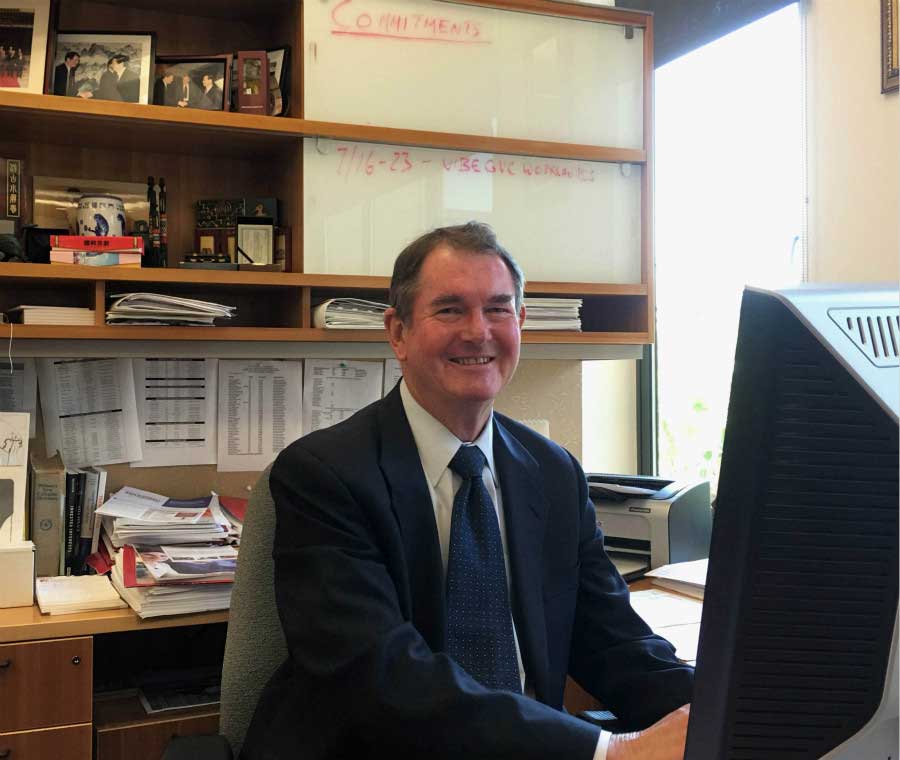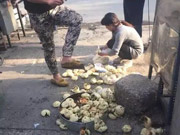

 |
| Nicholas Hope, director of the Stanford Center for International Development, talks about China's economy during the interview with People's Daily Online on May 28. (People's Daily Online/Han Shasha) |
San Francisco, June 8, — There are enormously effective improving economic performance in China. No one is free of problems if you are trying to manage the economy. I don't feel China is doing badly," Nicholas Hope, director of the Stanford Center for International Development (SCID) recently told People's Daily Online, looking back at China's economic development in the past decades.
Worked as the Chief of the World Bank External Debt Division, Hope recalled China's economic policy reform when he first visited China in 1993. He told People's Daily Online, "It worked very well. The macro reform that attempted to set up the most socialist market economy, that also worked very well."
In his opinion, he divided China's reform era into two parts. From 1978 to 1993, goods and services were still provided partially by the government. But the free market was sprouting. By 1993, the reform of the household responsibility system happened in rural areas. And there were boom and bust cycle beginning in 1994 and continuing now, which was sort of reemphasized by the 3rd Plenum of the 18th Party Congress . "So that second era is in some way even more challenging than the first, the first was difficult because we had a command economy that suddenly wanted to become a market economy," he said.
In November 1993, China announced the establishment of the socialist market economic system in the Third Plenum of the 14th Central Committee of the Communist Party of China and put forward the Fifty Decisions that involved a series of reforms aimed at overhauling its economy over the next decade. "It was extremely ambitious, and it involved just about everything you could think of it," Hope told People's Daily Online.
In 1994, Hope came back to Washington, D.C. as the Country Director for China at the World Bank. In 2000, Hope joined Stanford University and was involved with Chinese economy on a day-to-day basis.
"I had high hopes that foreign banks would involve themselves more heavily in the Chinese financial system, particularly after the WTO accession, and that hasn't really happened to a very large extent. The financial system still does not allocate resources in a market-determined fashion," Hope said. To illustrate this, he took China's "zombie firms" for example. Although some firms were bankrupt but kept alive by local decision makers. "Partly because I guess they don't want unemployed workers and others to be unhappy. "A lot of the loans that are made to these firms are simply used to pay wages and sometimes pensions, and they are not used for productive investment.
In addition to human capital, Hope emphasized the importance of greater efficiency in investment to economic growth, "China over the years has done wonderful job in investing in infrastructure." Infrastructure development remains a top priority for China's government mainly in roads and rails, electricity, and telecommunications. Hope added that China should improve its investment efficiency in other industries.
According to a report released by the government in January 2016, China's GDP growth rate moderated to 6.8 percent for the fourth quarter and 6.9 percent for 2015. The annual pace was the weakest in the quarter century. When asked about China's economic slowdown, Hope told People's Daily Online, "A few years ago at a conference with Tsinghua University, we had a very distinguished panel making presentations on the likely growth under China's 12th Five-Year Plan. At the 12th Five-Year Plan people were suggesting that the growth would be 7 to 8 percent. That didn't surprise me. Nothing grows at 10 percent forever, and China is the same."
He said "Slower growth in China was inevitable, now the concern I think the government has in the current situation is to grow slow faster than desirable, given the sort of constraints that the Chinese government has to deal with, given job creation, given migration from rural areas into urban areas, given the expectations of the Chinese citizens for continuing improvements and wellbeing. "
In March, the Government Work Report emphasized strengthening supply-side reform through cutting low-end supply while increasing high-end supply and public products and services. Chinese president Xi Jinping also called for "resolutely push forward supply-side structural reform" in a speech on May 16. "My response is that the supply-side reform proposals all make senses," Hope said. Meanwhile, he suggested that Chinese government should be more cautious when taking actions.
Hope raised a case in the steel industry as example. "When you talk about reducing excess capacity of steel production, you couldn't reproduce the extent of 300 million tones a year then you cut the other production to 150 million times the next year. That is not going to solve the problems, but it creates problems, " Hope said. Such bold and aggressive actions would create a large amount of displaced workers that need to be retrained and moved, and require a large fiscal capacity to take care of the unemployed workers.
"It was a unique event in world history, in which so many people improved their wellbeing by so much, over such a short period. It's a most extraordinary triumph for humanity. The transformation of the Chinese economy has been breathtaking. China as the second economy, almost equal to the US in the trading economy in terms of goods and merchandise trade, has played a major role in the evolution of the global economy."
Day|Week

 The last primitive tribe in China
The last primitive tribe in China China's first intelligent security robot debuts in Chongqing
China's first intelligent security robot debuts in Chongqing A Total of 3,552 Subscribers Vanish In Two Days; YouTube Closes All Doors to Users’ Inquiries
A Total of 3,552 Subscribers Vanish In Two Days; YouTube Closes All Doors to Users’ Inquiries Out of this world! Futuristic UFO-shaped yacht has its own garden and a stunning underwater viewing deck
Out of this world! Futuristic UFO-shaped yacht has its own garden and a stunning underwater viewing deck An old tea house in Chengdu
An old tea house in Chengdu Furious Customer Crushes All the Buns from Vendor Just Because He Was Given the Wrong Flavor
Furious Customer Crushes All the Buns from Vendor Just Because He Was Given the Wrong Flavor 20 post-90s couples hold ’naked marriage‘ in E. China
20 post-90s couples hold ’naked marriage‘ in E. China Female official wearing traditional Han costume to promote local tourism
Female official wearing traditional Han costume to promote local tourism Over 12,000 Runners Seek Medical Care in S China’s Marathon
Over 12,000 Runners Seek Medical Care in S China’s Marathon Six Luxury Sports Cars Totaled after Fail Attempts to Cross China’s Most Perilous Highway Linking SW China’s Sichuan and Tibet
Six Luxury Sports Cars Totaled after Fail Attempts to Cross China’s Most Perilous Highway Linking SW China’s Sichuan and Tibet